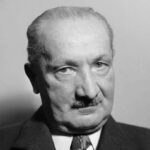
What do the moral code of your favorite sci-fi series, the foundation of human rights, and the existential crisis you had at 2 a.m. last Thursday all have in common? They’ve all been touched – if not completely inspired – by the profound legacy of German philosophy.
German thinkers from the Enlightenment through the 20th century didn’t just ask the big questions – they redefined them. From Kant’s reason-driven ethics to Nietzsche’s razor-sharp critiques of modern values, German philosophy has played a pivotal role in shaping modern politics, science, art, psychology, and our collective worldview.
This pillar article offers a broad overview of how Germany’s greatest minds continue to echo through every corner of contemporary thought – with plenty of paths for deeper exploration.
German Philosophy Overview
German philosophy as we know it began gathering momentum during the Age of Enlightenment. Immanuel Kant’s Critique of Pure Reason redefined the way we think about knowledge, truth, and morality. His work sparked an intellectual revolution that paved the way for an era of philosophical giants.
By the 19th century, the philosophical landscape was booming with bold thinkers who didn’t merely accept inherited traditions but overturned them. These were not just academic debates in ivory towers – these were the philosophies that would go on to inform the founding principles of countries, fuel revolutions, and shape artistic and scientific endeavors. What makes German philosophy particularly enduring is its persistent concern with the fundamental nature of reality, freedom, and the self.
Key Figures and Their Enduring Influence
Immanuel Kant – The Ethics of Reason
Kant revolutionized moral philosophy with his categorical imperative: the idea that we must treat others as ends, not means. His work remains foundational in modern ethical theory, political liberalism, and human rights philosophy.
Kant believed that human beings are rational agents capable of moral autonomy. His deontological ethics emphasized duty and the universality of moral law. These ideas became the basis of the modern human rights movement and continue to guide international law and governance.
- Explore his ideas: Immanuel Kant
- Read Kant’s words: Immanuel Kant Quotes
G.W.F. Hegel – History as Dialectic
Hegel saw history not as chaos, but as a logical process. His dialectical model of thesis-antithesis-synthesis influenced everything from historiography to Marxism to 20th-century critical theory.
His idea that “the real is rational and the rational is real” made history itself the unfolding of reason. Hegel’s influence extended far beyond philosophy – his ideas helped frame our modern understanding of statehood, progress, and collective identity.
- Dive deeper: Georg Wilhelm Friedrich Hegel
Arthur Schopenhauer – Life as Will
Schopenhauer viewed the world through the lens of suffering and desire. His concept of the “will to live” laid groundwork for existentialism, psychology, and even Wagnerian opera.
He offered a profoundly pessimistic view of life, arguing that human desires are insatiable and that suffering is a constant. Yet in this bleak worldview lay the seeds of modern existential and psychological thought – from Freud to Camus.
- More on: Arthur Schopenhauer
Karl Marx – Praxis and Power
Marx fused philosophy with revolution. He reinterpreted Hegel’s dialectics into materialist terms, giving rise to socialist and communist ideologies that reshaped the political world.
For Marx, philosophy was not simply about interpreting the world, but changing it. His critique of capitalism and vision of class struggle gave rise to some of the most influential political ideologies of the 20th century, with echoes still felt in today’s social justice movements.
- Explore: Karl Marx
Friedrich Nietzsche – Morality Reimagined
Nietzsche asked us to confront uncomfortable truths. He famously declared the “death of God,” criticized herd morality, and introduced concepts like the Übermensch and eternal recurrence.
Rather than offering a traditional system of ethics, Nietzsche explored the psychological underpinnings of moral values. His influence spans literature, psychoanalysis, political theory, and postmodern thought.
- Read more: Friedrich Nietzsche
- His voice: Friedrich Nietzsche Quotes
Heidegger – Reawakening the Question of Being
Martin Heidegger’s seminal work, Being and Time, reintroduced the fundamental question: “What does it mean to be?” Heidegger’s concept of Dasein describes human existence as being inherently situated in a world, emphasizing authenticity and the individual’s relationship with time and death.
Heidegger’s later writings delve into the essence of technology, cautioning against its potential to alienate humanity from authentic existence. He introduced the idea of “enframing,” where technology imposes a framework that limits our understanding of being. Despite controversies surrounding his political affiliations, Heidegger’s influence persists in existentialism, hermeneutics, and deconstruction.
- Read more: Martin Heidegger
Politics and Social Theory
German philosophers have not only critiqued the status quo – they’ve helped redefine it. Kant’s emphasis on human dignity underpins the modern notion of universal rights. Hegel’s vision of the rational state influenced constitutional theory. Marx’s revolutionary politics called attention to structural injustice, while Nietzsche’s suspicion of power and conformity set the stage for later critiques of ideology.
Contemporary debates around nationalism, democracy, social justice, and globalism are all enriched – and complicated – by the legacies of German philosophy.
Psychology and the Inner Self
Modern psychology owes much to German thought. Schopenhauer’s and Nietzsche’s focus on unconscious motivation prefigured Freud’s theory of the unconscious. Nietzsche’s exploration of identity, guilt, and repression can be seen in everything from psychoanalysis to trauma studies.
Jung’s archetypes, Adler’s theories of power, and even modern cognitive-behavioral therapy echo the deep influence of these philosophical ideas.
Science and the Structure of Knowledge
Kant’s influence is particularly notable in science. His distinction between the phenomenal and noumenal realms set the stage for theories that questioned whether we can ever perceive objective reality. These insights are echoed in quantum mechanics and relativity theory.
In cognitive science, Kant’s model of the mind as an active participant in the construction of knowledge continues to inform studies of perception, cognition, and artificial intelligence.
Art, Aesthetics, and Cultural Expression
Kant’s Critique of Judgment founded modern aesthetics, distinguishing between the beautiful and the sublime. Schopenhauer’s concept of art as a temporary escape from suffering deeply influenced Romanticism.
Nietzsche’s celebration of tragedy and the Dionysian shaped everything from Wagner’s operas to modernist literature. Expressionism, Dadaism, and existential theatre all bear the fingerprints of German philosophy.
Modern Ethics and Authenticity
In a world flooded with relativism and cultural pluralism, the ethical clarity – or provocation – of German philosophy offers both comfort and challenge. Kant’s deontology demands universal responsibility. Nietzsche’s ethics of authenticity and becoming critique herd morality and passive obedience.
Meanwhile, Schopenhauer’s ethics of compassion, though less cited, offers a counterbalance of empathy to Nietzsche’s heroic individualism. These varied perspectives remain relevant in our debates over freedom, equity, and what it means to live a good life.
Practical Applications and Everyday Echoes
- In Politics: From social contracts to socialist manifestos, German philosophers have laid the groundwork for ideologies that continue to shape elections, legislation, and activism.
- In Psychology: Nietzsche’s aphorisms are now found in motivational books and therapy offices alike. Schopenhauer’s bleak realism resonates with modern mental health discussions.
- In Science and Tech: Kant’s epistemology is quietly embedded in AI algorithms and virtual reality – any space where human cognition constructs perceived worlds.
- In Popular Culture: From Marvel’s morally complex heroes (Übermensch, anyone?) to dystopian ethics in “Black Mirror,” German philosophy is in our screens as much as our schools.
German philosophy has left an indelible mark on nearly every facet of modern life. Whether you’re navigating an ethical dilemma, watching a sci-fi series, or contemplating the future of democracy, chances are you’re walking in the footsteps of Kant, Hegel, Marx, Nietzsche, or Schopenhauer.
Their legacies aren’t just intellectual – they’re deeply human, wrestling with the questions we all face: What is truth? How should we live? What makes us free?
Curious to learn more about how German minds reshaped modernity? Explore our deep dives into Immanuel Kant, Karl Marx, Friedrich Nietzsche, Georg Wilhelm Friedrich Hegel, Martin Heidegger, and Arthur Schopenhauer.







